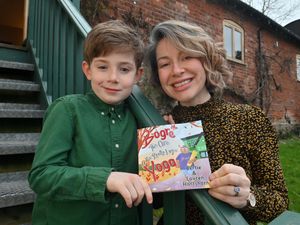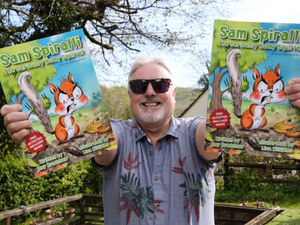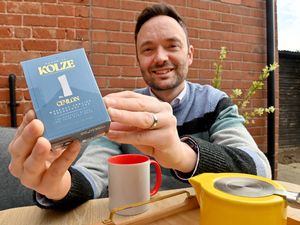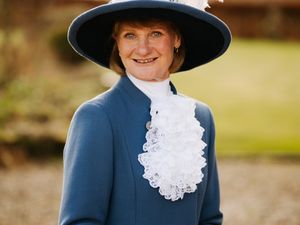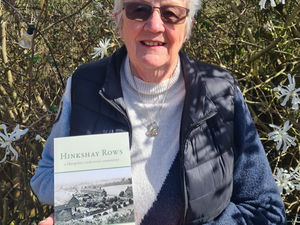Who cares wins, says SAS television star Ollie
As a nine-year-old boy, Matthew 'Ollie' Ollerton watched in awe as television cameras broadcast a crack team of SAS troops abseiling from the roof of the Iranian embassy in London to rescue hostages being held by an Arab terror group.
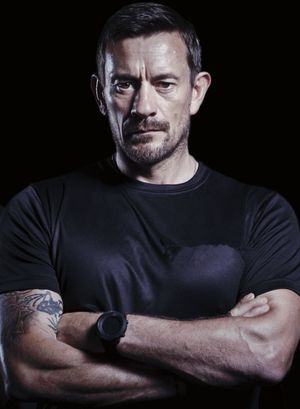
From that moment the nine-year-old's mind was made up. When he was old enough, he was going to join the special forces.
“I wanted to dress in black, jump out of helicopters, smash the target, jump back on and be back home for tea and medals,” recalls the star of the television series SAS: Who Dares Wins.
As a youngster, Ollie was always one to push the boundaries. A few weeks after watching the SAS heroics in May, 1980, he found himself in a life-or-death situation of his own when he got into a fight with a chimp at the circus. This not only left him with horrific injuries, but even more bizarrely led to a chance meeting with movie star Brigitte Bardot.
There were more scrapes during his teenage years, when he stole a neighbour's shotgun and started scaring people at night. But this lack of fear also gave him a single-mindedness which saw him excel in the special forces, giving him a sense of invincibility as he battled with armed drugs gangs in Iraq.
And Ollie, now 50 and living in the Shropshire Hills, is hoping his 'never say die' attitude will help four disabled military veterans earn a place in the record books as the first adaptive rowing team to navigate the entire length of the UK by kayak.
After five years of putting both civilians and celebrities through the sort of gruelling challenges which were par for the course during his time in the military for the hit reality show, Ollie will now be using his motivational skills to help four military veterans earn their place i the record books.
In July former army reservist Darren Edwards, ex-RAF gunner Luke Wigman, former army officer Jonny Huntington, and Carl Symonds who served 23 years in the forces, will begin their 886-mile row from Land's End to John O'Groats. More than that, they will be seeking to complete the challenge in 35 days, also breaking the record as the fastest team to complete the feat. And if that were not enough, they have also set themselves a target of raising £100,000 for two charity which with the disabled: the Armed Forces Para-Snowsports Team, and the Association for the Independence of Disabled People.
The journey will see the team negotiating the Bristol Channel before heading up the River Severn towards the West Midlands, where they will then make their way through the numerous canals on which the Industrial Revolution was built.
Ollie is in no doubt about the size of the task, which will see them row an average of 25 miles every day, but believes his skills as a motivator and organiser will keep the expedition on track. His experience with kayaks, with which he had to prove himself as part of the selection process for the Special Boat Service, will come in handy, too.
"I think my no-nonsense, yet empathetic approach will contribute greatly towards the mentoring of these brave individuals," he says.
“When a team are taking on a challenge such as this, it’s important that they form a close-knit bond in order to succeed. I want to make sure these men share a positive outlook as they face this challenge to better be able to support one another and utilise teamwork as one of their most important skills.”
He says embarking on such a large challenge involves a lot more planning work than people realise.
"There's a lot of logistics involved, there 's a lot of moving parts, you have got to have the right support," he says. "It's not just a case of getting in the boat and rowing."
From pushing through their pain tolerances to get them to reconsider their attitudes towards their disabilities, Ollie says he can also help with their healing and recovery process.
And his ability to motivate people in this way is in no small part down to his own battles with what he calls the 'break points' that have punctuated his life.
"The break point is the point at which you realise you have got to endure some short-term discomfort for long-term gain," he says.
The first of his many difficult experiences came when Ollie visited the circus as a 10-year-old living in Burton-upon-Trent.
"I was in a place where I shouldn't have been, round the back of the circus, when I saw a baby chimp in a pound," he says.
"I went in to have a look, and he was giving me a banana. But then his mother saw me, and didn't like this at all, and she wrestled me to the ground and was biting lumps out of my arm."
Somehow, he briefly managed to fight off the angry primate just as a circus worker entered the tent and pulled her away by her chain.
"The short-term discomfort of that break-point came when I took the fight to the chimp, and the long-term gain was living," he says.
But the attack left him with horrendous injuries – he came close to losing his right arm – and the scars were not just physical.
A few weeks later, on holiday on the Cote D'Azur, Ollie's family noticed a strange smell in their caravan.
"My dad was opening all the doors of the cupboards, putting bleach down the sink," he recalls.
"After a while he realised the smell was coming from me. I undid the bandage one or two turns and you could see the green underneath. My wound had gangrene."
He was rushed to hospital again, this time to a swish clinic in St Tropez, where he says the pain of the treatment was worse than being bitten. As the doctor escorted the Ollie and his father through the VIP waiting room on the way out, he introduced his father to an immaculately turned out blonde woman, with her hair in a beehive, who kissed his father on the cheek.
"As we left and reached the bottom of the stairs, he turned and said to me, 'Son, I can’t believe it. I’ve just met Brigitte Bardot!'," says Ollie.
But while his dad was delighted, it only added to Ollie's unhappiness.
"All I wanted was a hug from my dad. I’d been through this terrifying experience, and he was made up because he’d met a 1960s actress I’d never heard of," he says.
"When we got back to the caravan, no one could believe that I’d been bitten by a chimp and ended up meeting Brigitte Bardot. It was a silver lining, apparently, but I felt rejected.
"I still have the scar on my arm to remind me. I hated every moment of that holiday, yet it taught me resilience, and how to push through the pain and boredom barrier."
Another low point in his life came was when his parents split up when he was 13. He began to rebel, first by burning down a barn next to their house. He took it a stage further when he stole a shotgun from a neighbour and started venturing out at night and scaring people by firing over their heads.
The two weeks he spent on remand, followed by a two-year supervision order, proved to be something of a wake-up call. At 18 he joined the Royal Marines Commandos, serving in Northern Ireland and in Iraq during Operation Desert Storm in 1991.
After five years in the Commandos he passed the six-month combined SAS and SBS selection course in 1994, serving for six years as a Special Forces frogman. For his first mission, his troop intercepted a ship loaded with drugs and guarded with guns.
Ollie says: “We headed for the sleeping quarters, kicked open the door, threw in a flash-crash grenade and started making a terrible racket. When my target opened his eyes, he was looking at a man dressed all in black, wearing a balaclava and pointing a machine gun at his face."
But while he had dreamed of joining the special forces as a child, the reality proved not to be quite so exciting.
"I didn't find my sense of purpose in the military, there was always something missing," he says.
Three years after leaving the SBS in 2000, he returned to Iraq as a security contractor and mercenary. The work was lucrative – at one point he was earning £13,000 a month – but not especially rewarding. It was at this time that he started drinking heavily, became dependent on anti-depressants, and started injecting steroids.
While escorting a television news crew, Ollie's team found themselves under attack in an incident he had eerily visualised the night before.
“The windows came down on the front vehicle and four AK-47s emerged," he says. "There I was, staring into the eyes of a young boy, his AK-47 pointed at my face from two feet away.
“My pal and I squeezed our triggers and that was it. I could see black plumes pouring from the car and knew they weren’t coming after us.”
It was only when he started his next job, helping to bust child-trafficking rings in Thailand, that he finally found the sense of purpose he had been looking for.
Working for the Grey Man charity, he led a mission to rescue 22 children destined for the sex trade, and realised that the skills he had learned meant he could make a tangible difference to people's lives.
"It was something amazing for me, I understood the power of helping other people," he says.
But it wouldn't last, and the depression returned. Political upheavals brought that work to an abrupt end in 2011, and Ollie began to have suicidal thoughts.
"I don't know if I would have done it, but for me having the thoughts were enough," he says.
"I said to myself, 'that's not how the story ends, and decided I had got to get my life back on track.
"It was then that I realised I had to realised I had been bouncing around the globe for years and years, trying to find this extraordinary fix that was going to make me happy, but that the only thing that was going to make me happy was going to come from within myself."
After a brief spell living in Australia, he teamed up with his old SBS mate Jason 'Foxy' Fox to set up their business Break Point, based in Atcham, near Shrewsbury, which provides leadership and development courses.
Now finally living a contented life in his idyllic farmhouse in the Shropshire Hills with fiancee Laura, he gets up at 5am every day to meditate and visualise his ambitions. In his spare time he enjoys walking with his dog Murphy, and when rules permit, riding his motorbike and camping.
He has also made his name as an author. His autobiography Break Point went on sale in 2019, followed by his self-help guide Battle Ready, and he made his fiction debut with Scar Tissue, a novel loosely based on his own experiences in November last year.
His own mental battles prompted him to form the StrongMen charity, which helps men tackle the mental, emotional and physical health conditions brought about by bereavement.
He says there are a lot of misconceptions about the special forces, who are not necessarily the ruthless killing machines depicted on television.
"We are not always the most muscly guys. We are not without emotion," says Ollie.
"I used to be the typical alpha male, I would go around with a smile on my face, and people would say 'Ollie's a good laugh', but they didn't know what was going on underneath.”
*For more information, or to donate, see the website Kayak4heroes.co.uk

